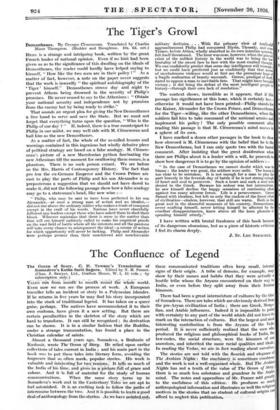The Tiger's Growl
Demosthenes. By Georges CIL-menceau. Translated by Charles Minor Thompson. (Hodder and Stoughton. 10s. lid. net.) HERE is a strange and intriguing book, written by the great French leader of national opinion. Even if no hint had been given us as to the significance of this dwelling on the ideals of Demosthenes, the reader could hardly have helped saying to himself, " How like the two men are in their policy ! " As a matter of fact, however, a note on the paper cover suggests that the work is inwardly " the spiritual autobiography of the ' Tiger' himself." Demosthenes strove day and night to prevent Athens being drowned in the security of Philip's promises. He never ceased to say to the Athenians " Obtain your national security and independence not by promises from the enemy but by being ready to strike."
That sounds an urgent plea for giving the New Demosthenes a free hand to serve and save the State. But we must not forget that everything turns upon the question, " Who is the Philip of our day ? " If, indeed, there is a true counterpart to Philip in our midst, we may well side with M. Clemenceau and bail him as the new Demosthenes.
As a matter of fact, the whole of the so-called lessons and warnings contained in this ingenious but wholly delusive piece of political strategy are based on a false analogy. M. Clemen- ceau's picture of a new Macedonian python fascinating the new Athenians till the moment for swallowing them comes, is a phantom. There is no such person extant. We see before us the Mrs. Harris of Contemporary History. The fact that pro tern the ex-German Emperor and the Crown Prince are cast to play the parts of Philip and his son Alexander is so preposterous a suggestion that we should not have dared to make it, did not the following passage show how a false analogy may go to a statesman's head, like new wine :-
" Philip, who may be said to have been perfected in his son Alexandet—at once a strong man of action and an idealist—. did not rise above the ordinary soldier who makes a trade of conquest except in the craft of his words. Nations have never cheerfully followed any leaders except those who have asked them to shed their blood. Whoever maintains that there is more in the matter than that will see himself suddenly called to make his empirical proofs on the vast field of battle where all the interests and all the passions will take every chance to misrepresent the ideal—a course of action for which opportunity will never be lacking. Philip and Alexander were perhaps greater than their unachieved and unachievable military deidinies. . . . With the primary "vieii of territoeo aggrandisement Philip had conquered Dyne, 'Ihessaly, and even Thrace, before Attica, wholly absorbed in its own intestine quarre,, felt itself threatened. The hour was near, however, when the grai,t crisis of the noblest history in the world was to bring the lev, brutality of the sword face to face with the most exalted thought We can confidently predict that some day intelligence will triumph; but we could have predicted just as confidently that that stem of unwholesome violence would at first see the premature hope of a fragile realization of beauty succumb. Greece, prodigal of neeli, dared to oppose a man to inevitable fate. That might have brought victory ; it did bring the defeat of the most intelligent people is history—through their own lack of resolution."
The context shows, incredible as it appears, that if this passage has significance at this hour, which it certainly has_ otherwise it would not have been printed—Philip stands for if the Kaiser, Alexander for the Crown Prince, and Demosthenes for the Tiger—willing, like the other Demosthenes, when the soldiers fail him to take command of the national armies and implement his policy ! The only possible comment after reading this passage is that M. Clemenecau's mind mos es in a sphere of its own. fl I have marked a dozen other passages in the book to show how obsessed is M. Clemenceau with the belief that he is the New Demosthenes, but I can only quote two with the barest comment. After insisting that the great desideratum when there are Philips about is a leader with a will, he proceeds to show how dangerous it is to go by the opinion of soldiers :— " In the case of Demosthenes we cannot doubt which was to blame ; the leader was great, the soldiers were unfit. The lesson is too clear to be mistaken. It is not enough for a man to play ins part bravely in the feverish day of battle if he is not strong enough of heart and soul to persevere. ' Such a heart and such a soul were denied to the Greek. Because his ardour was but intermittent, he saw himself decline the happy sensation of continuing effort against too many adverse forces. Life is a perseverance. Greece flamed with idealism, but left us only the cinders of the finest effort of civilization—cinders, however, that still are warm. Both in the great and in the shameful moments of his country, Demosthene. never exalting himself, never letting himself be affected by the cruellest disappointments, knew above all the keen pleasure o, spending himself utterly."
I have written with brutal frankness of this book because of its dangerous obsessions, but as a piece of historic criticise I feel its charm deeply.
o
44
I
11 a
J. ST. LOE STRACHEY.






























































 Previous page
Previous page